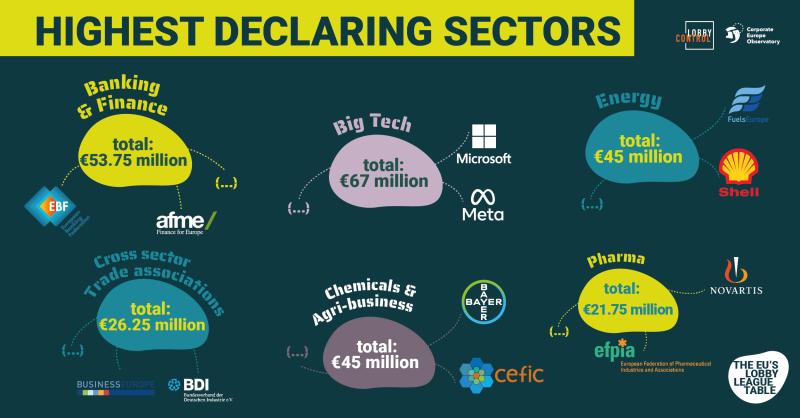
When industry wish-list becomes policy
Corporate lobbying spending soars
Brussels, 24 February 2025 – On 26 February, European Commission President Ursula von der Leyen is expected to go to Antwerp to outline the EU's corporate-friendly Clean Industrial Deal. The huge sums spent on EU lobbying by the biggest corporate interests are already clearly paying off, given the pro-business agenda of the second von der Leyen Commission. Our new analysis shows that EU decision-making faces a real risk of regulatory capture, with almost no effective protections in place.
New research by lobby watchdogs Corporate Europe Observatory and LobbyControl (‘The EU's lobby league table: Tech, Banking, Energy, Chemicals dominate’,) reveals that corporate lobby spending has reached unprecedented levels. The top spenders alone (those declaring over €1 million) have increased their total spend by one-third since 2020, growing by €41 million in just the past year. This surge in spending is reflected in the pro-business agenda of the second von der Leyen Commission.
The research is based on data from our data platform LobbyFacts. Key findings include:
-
Total lobbying spends: The 162 corporations and trade associations which declare EU lobby budgets of over €1 million annually, collectively declare at least €343 million per year.
-
Yearly increase: This represents a 13 per cent increase compared to the same time last year.
-
Five-year growth: Since 2020, these corporate interests have declared nearly €86 million more, marking a one-third increase over five years.
-
Underestimation: These figures are likely to be substantial underestimates, as explained in the analysis. (Data as of 8 February 2025)
"With corporate lobbying at record levels, it’s no surprise that industry’s demands are shaping EU policy. The Clean Industrial Deal risks becoming yet another example of corporate capture—where subsidies and deregulation take precedence over environmental and social justice. Without strong transparency rules and enforcement, as well as initiatives to counter regulatory capture, industry will continue to massively influence the EU’s agenda behind closed doors," warned Corporate Europe Observatory researcher and campaigner Vicky Cann.
Top corporate lobby sectors
The highest-declaring sectors among those registrants with lobby budgets of €1 million or more are Big Tech (€67 million including Meta, Microsoft); Banking & Finance (€53.75 million including Association for Financial Markets in Europe, European Banking Federation); Energy (€45 million including FuelsEurope, Shell); Chemicals and Agribusiness (€45 million including European Chemical Industry Council, Bayer); the cross-sector trade associations (€26.25 million including BusinessEurope, Bundesverband der Deutschen Industrie); and Pharma (€21.75 million including European Federation of Pharmaceutical Industries and Associations, Novartis).
The art of under-reporting?
The real figures are likely to be even higher. Despite having Brussels-based offices, full-time lobbyists, and multiple trade association affiliations, some companies and trade associations report implausibly low lobby budgets. For example our analysis suggests that some major firms—including Nestlé, Unilever, and Yara—could be under-reporting their spending. This raises serious concerns about the data and enforcement in the official—but ultimately voluntary—EU Lobby Transparency Register.
Trade associations such as FoodDrinkEurope and the European Round Table for Industry (ERT) also declare what we consider to be unrealistically low lobby expenditures despite extensive engagement with EU policymakers. For example, FoodDrinkEurope, declares only €200,000-299,999 in annual EU lobbying costs, despite a €5.4 million total turnover and significant staffing expenditure. The ERT declares only €400,000-499,999 annual EU lobby spend even though it has had more than 150 high level meetings with the Commission in the past 10 years and is widely seen as one of the most influential lobby groups in Brussels.
Such concerns can arise because the EU Lobby Register is only voluntary and lacks strong enforcement mechanisms. Until there is a legally binding register, corporate players will continue to exploit these weaknesses, limiting transparency and undermining democratic accountability.
While corporate lobbyists pour hundreds of millions into influencing EU policy, recent political and media debates have disproportionately focused on the €15 million in LIFE funding received by green NGOs for a variety of activities. This stark contrast raises concerns about whose influence is really shaping EU decision-making.
Nina Katzemich, LobbyControl campaigner says: "When major corporate lobbyists are spending record sums to shape EU policy – and can still under-report their influence without consequences - it’s clear the EU’s transparency system is failing. A voluntary register riddled with problematic data is no match for corporate power. The only way to ensure accountability is to make lobby transparency rules legally binding. A diversionary debate about NGO transparency alone is completely out of place."
The upcoming 2025 review of the EU Lobby Register presents a crucial opportunity to introduce binding rules, ensuring transparency and accountability in Brussels’ corridors of power. To prevent undue corporate influence over policymaking the EU must also overhaul its lobby regulations.
ENDS
For media inquiries, please contact:
Vicky Cann, Corporate Europe Observatory researcher and campaigner
vicky@corporateeurope.org ; +44 7960 988096
Nina Katzemich, LobbyControl campaigner
nina.katzemich@lobbycontrol.de
Notes to editor
-
You can read the full analysis here.
-
The data used in this analysis comes from LobbyFacts, a joint project by Corporate Europe Observatory and LobbyControl. On a daily basis since 2012 LobbyFacts has been collecting the data from the EU Lobby Transparency Register. The LobbyFacts’ archive is unique and enables comparisons in declared lobbying across periods of time.
-
The figures reflect declared annual lobbying expenditures of the 162 corporations and trade associations that report spending over €1 million on EU lobbying. The true sum of all corporate spending on EU lobbying would be significantly higher. The dataset was extracted on 8 February 2025.
-
In the past months some media and the political right have been totally preoccupied with the non-story of €15 million received by green NGOs from the EU’s LIFE funding programme, which covers all sorts of civil society activities, while under their noses, the biggest corporate lobbies have spent at least €343 million a year on EU lobbying, including a €41 million increase just in the past year.
